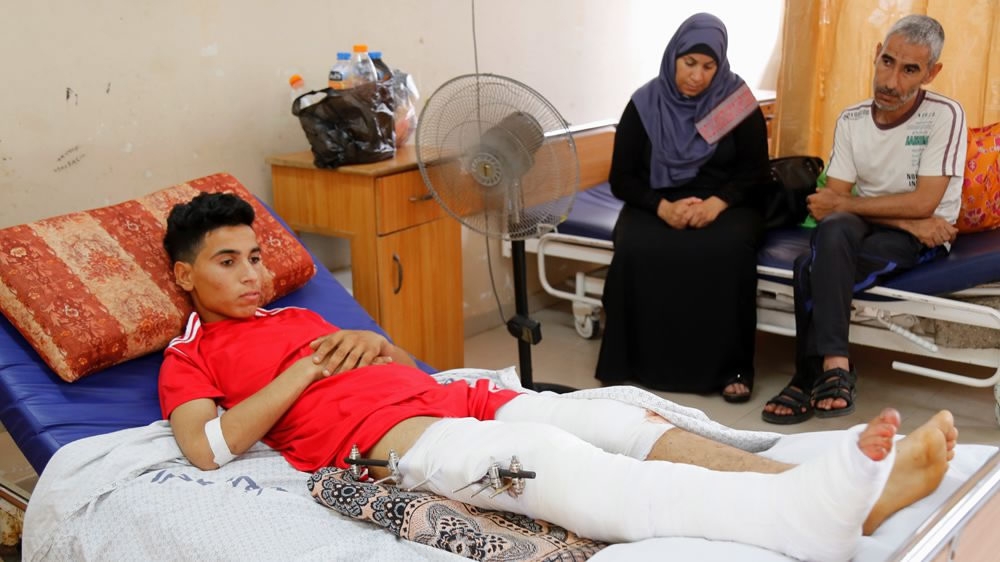Australia/Israel Review
Deconstruction Zone: Gaza’s self-inflicted health crisis
Mar 1, 2019 | Evelyn Gordon

Gaza’s health system is on the verge of collapse, Israeli defence officials warned recently. Their report echoed an international aid agency’s findings that Gaza hospitals are severely short of doctors, especially specialists, and lack 60% of necessary medications, including basics like painkillers and antibiotics. Entire hospital departments have closed due to the inability to offer treatment, and patients with cancer, diabetes or renal failure are simply being sent home.
You might think this situation would prompt at least one of the Palestinians’ two rival governments to take action. But you’d be wrong
The Palestinian Authority (PA), which repeatedly proclaims itself the sole legitimate government of both the West Bank and Gaza and is recognised as such internationally, receives billions in international aid to provide for humanitarian needs in both places. It ostensibly budgets 150 million shekels a year (A$58 million) for medical supplies for Gaza. But it hasn’t paid this money in months.
Yet this same PA has no trouble finding $460 million a year to pay salaries to jailed terrorists or families of terrorists. Evidently, paying terrorists is more important to it than its people’s health.
Nevertheless, the PA’s behaviour pales beside that of Gaza’s real governing authority, Hamas. Two weeks ago, Hamas discussed the humanitarian problem with foreign officials, who then presented its ideas to Israeli officials. The organisation proposed three possible scenarios, Haaretz reported. None of them involved Hamas lifting a finger to help the people it governs.
Indeed, Hamas leader in Gaza Yahya Sinwar “made clear that under any of these scenarios, Hamas would not disarm,” wrote reporter Yaniv Kubovich. In other words, it won’t divert any of the hundreds of millions of dollars a year it spends on its own military to ease Gazans’ humanitarian plight.
And it’s not as if the organisation couldn’t afford to do so. As Haaretz reported, aside from about 130 million shekels a year that Hamas raises through taxes in Gaza, Qatar alone has given Gaza US$1 billion over the last seven years, including US$200 million last year. And unlike the billions Gaza receives from other international donors, part of the Qatari money – 16%, or US$160 million – has gone directly to Hamas for its own use and that of other terrorist groups in Gaza.
That’s almost four times what the PA spent annually on medical supplies for Gaza back when it was still financing Gaza’s health system.
So what did Hamas propose instead? That someone else solve the problem. Responsibility for Gaza could be handed over to the PA, the United Nations or Egypt, it suggested. And if none of them is willing, Hamas’ backup plan is to launch a war against Israel “that would end with an international force occupying the Strip,” Kubovich wrote – that is, another way of trying to shift responsibility to someone else.
Of course, all these plans are nonstarters as long as Hamas refuses to disarm because nobody wants responsibility for Gaza while an armed group inside it is repeatedly attacking Israel. That’s why neither Egypt or the United Nations, nor any other international player offered to take responsibility for Gaza after its three previous wars with Israel, and they wouldn’t do so after another war either. As for the PA, it has said explicitly that it won’t assume responsibility for Gaza unless Hamas disarms.
Hamas knows all this. But being able to continue attacking Israel is more important to it than enabling a solution to its people’s medical crisis.
Yet not content with merely refusing to solve the crisis, Hamas is actively making it worse. Indeed, a major factor in the crisis has been the overload of patients caused by Hamas’ insistence on holding violent mass protests near the Israeli border every week for almost a year now. During these protests, many Palestinians have been shot while trying to break through the border fence or clashing with Israeli soldiers.
According to Haaretz, a whopping 6,000 people with gunshot wounds still await operations, and about one-quarter of them have developed infections that will lead to amputations if not treated soon. Gazan hospitals have closed other departments to focus on treating the weekly influx of new wounded. Yet rather than stop the demonstrations to ease the pressure on its overloaded medical system, Hamas insists on staging new ones every week.
You might think the fact that, for both Palestinian governments, prioritising anti-Israel terror over their own people’s urgent health needs would make them unpopular. But while some Palestinians are indeed fed up, many share their governments’ priorities.
A recent Associated Press story featured two men whose sons were wounded at the weekly protests. One father tried to keep his son from attending and was devastated that the boy disobeyed and got hurt. But the other intentionally brought his son to the protest and claims to have no regrets, even though the boy now has a permanent limp.
“This is the tax you have to pay to achieve the right of return,” that father said, referring to the Palestinian goal of turning Israel into a Palestinian-majority state by flooding it with millions of descendants of refugees. In other words, he was willing to have his son lamed for the sake of destroying Israel.
In sum, what motivates both Palestinian governments and many ordinary Palestinians isn’t the desire to have their own state, but the desire to eradicate the Jewish one. On that altar, they are willing to sacrifice even basic humanitarian necessities like lifesaving medical care.
Evelyn Gordon is a veteran journalist and commentator living in Israel. © Jewish News Syndicate (jns.org), reprinted by permission, all rights reserved.
Tags: Fatah, Gaza, Hamas, Israel, Palestinians






